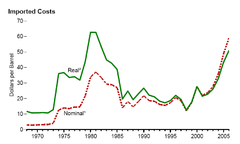Energy crisis of the 1970s

Real and Nominal price of oil, 1968–2006.
|
|
| Date | 1973–1980 |
|---|---|
| Also known as | 1970s oil crisis |
The 1970s energy crisis was a period when the major industrial countries of the world, particularly the United States, Canada, Western Europe, Japan, Australia, and New Zealand, faced substantial petroleum shortages, real and perceived, as well as elevated prices. The two worst crises of this period were the 1973 oil crisis and the 1979 energy crisis, when the Yom Kippur War and the Iranian Revolution triggered interruptions in Middle Eastern oil exports.
The crisis began to unfold as petroleum production in the United States and some other parts of the world peaked in the late 1960s and early 1970s. World oil production per capita began a long-term decline after 1979.
The major industrial centers of the world were forced to contend with escalating issues related to petroleum supply. Western countries relied on the resources of potentially unfriendly countries in the Middle East and other parts of the world.
The crisis led to stagnant economic growth in many countries as oil prices surged. Although there were genuine concerns with supply, part of the run-up in prices resulted from the perception of a crisis. The combination of stagnant growth and price inflation during this era led to the coinage of the term stagflation.
By the 1980s, both the recessions of the 1970s and adjustments in local economies to become more efficient in petroleum usage, controlled demand sufficiently for petroleum prices worldwide to return to more sustainable levels.
The period was not uniformly negative for all economies. Petroleum-rich countries in the Middle East benefited from increased prices and the slowing production in other areas of the world. Some other countries, such as Norway, Mexico, and Venezuela, benefited as well. In the United States, Texas and Alaska, as well as some other oil-producing areas, experienced major economic booms due to soaring oil prices even as most of the rest of the nation struggled with the stagnant economy. Many of these economic gains, however, came to a halt as prices stabilized and dropped in the 1980s.
During the 1960s petroleum production in some of the world's top producers began to peak. Germany reached its production peak in 1966, Venezuela and the United States in 1970, and Iran in 1974.Canada's conventional oil production peaked around this same time (though non-conventional production later helped revive Canadian production to some degree). The worldwide production per capita peaked soon afterward.
...
Wikipedia
